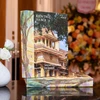The Vietnam Buddhist Sangha hosted a ceremony on November 12 in Hanoi to receive a certificate of “the most unique architecture in Asia” awarded to the One Pillar Pagoda, a historic Buddhist temple in Hanoi.
The Asian Records Organisation made the recognition in Faridabad of India on October 10.
Originally dubbed Dien Huu, which means long-lasting happiness and good luck, the pagoda was built in 1049 at the order of King Ly Thai Tong. During the Ly Dynasty, it was the site where royal ceremonies were held to celebrate such Buddhist events as Vesak or Buddha’s birthday.
The pagoda was built of wood on a single stone pillar 1.25m in diameter, 4m high and resembled a great square-shaped lotus blossom, the Buddhist symbol of purity.
With all its architectural and historical values, the pagoda was classified as a national historic site in 1962.-VNA.
The Asian Records Organisation made the recognition in Faridabad of India on October 10.
Originally dubbed Dien Huu, which means long-lasting happiness and good luck, the pagoda was built in 1049 at the order of King Ly Thai Tong. During the Ly Dynasty, it was the site where royal ceremonies were held to celebrate such Buddhist events as Vesak or Buddha’s birthday.
The pagoda was built of wood on a single stone pillar 1.25m in diameter, 4m high and resembled a great square-shaped lotus blossom, the Buddhist symbol of purity.
With all its architectural and historical values, the pagoda was classified as a national historic site in 1962.-VNA.



















